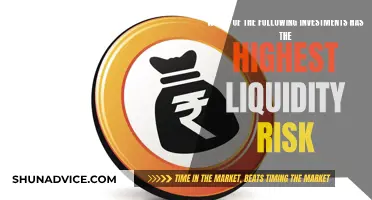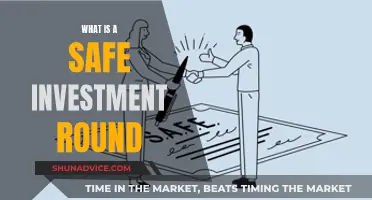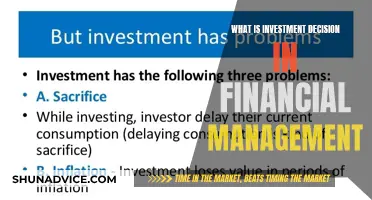
An investment trust is a company that pools investors' money to invest in bonds, property, shares, and other assets on their behalf. They are constituted as public limited companies and are therefore closed-ended funds. Investment trusts are led by an independent board of directors who hire a fund manager responsible for making investments and ensuring shareholders get value for money. Shares in investment trusts are traded on stock exchanges, and the price depends on supply and demand rather than the actual value of their combined holdings (net asset value). Investment trusts are able to borrow money to buy bigger stakes in investments, a process known as gearing, which can be lucrative but also dangerous as it amplifies gains and losses.
What You'll Learn

Investment trusts are public limited companies
An investment trust is a public limited company that aims to make money by investing in other companies. Owning shares in an investment trust is a way of investing in a variety of different companies. An independent board of directors is elected by shareholders to monitor the performance of the company and look after shareholder interests. The board chooses a professional portfolio manager to manage the company's investments.
Investment trusts are mostly found in the United Kingdom and Japan. They are constituted as public limited companies and are therefore closed-ended funds, as fund managers cannot redeem or create shares. Investment trusts issue a fixed number of shares at launch. This allows them to take a long-term view and borrow money, which allows greater exposure to stock markets in pursuit of higher returns.
The first investment trust was the Foreign & Colonial Investment Trust, started in 1868 "to give the investor of moderate means the same advantages as the large capitalists in diminishing the risk by spreading the investment over a number of stocks".
In the United Kingdom, the term "investment trust" has a strict meaning under tax law. However, the term is more commonly used within the UK to include any closed-ended investment company, including venture capital trusts (VCTs).
Cloud Computing: Transforming the Future of Investment Management
You may want to see also

They aim to make money by investing in other companies
An investment trust is a public limited company that aims to make money by investing in other companies. They are constituted as public limited companies and are therefore closed-ended funds, as fund managers cannot redeem or create shares. Investment trusts pool investors' money to make investments on their behalf.
Investment trusts are led by an independent board of directors elected by shareholders to monitor the performance of the company and look after shareholder interests. The board chooses a professional portfolio manager to manage the company's investments. The board has a legal obligation to safeguard shareholders' interests.
Investment trusts are often called 'the city's best-kept secret' and are highly regarded by finance professionals. They have been around since the Victorian era and the first investment trust was the Foreign & Colonial Investment Trust, started in 1868.
Investment trusts have a fixed number of shares, meaning that investors may only invest when the trust is launched or if someone wants to sell. This close-ended policy gives trust managers freedom to pursue their objectives without being pressured to add investments when new money flows in and offload them when investors exit.
Investment trusts can borrow money to buy bigger stakes in investments, a process known as gearing. This can be lucrative but also dangerous as it amplifies gains and losses. Investment trusts can trade at a premium or discount to the value of their underlying investments.
Investment trusts can withhold up to 15% of their income to deliver back to investors in the form of a dividend payout at a later date, such as when returns are down. This differs from open-ended funds, which return all income to investors. This means that investors should always receive a stable or steadily increasing income, regardless of the economic climate.
By buying shares in an investment trust, an investor becomes a company shareholder. They can then vote on issues such as the appointment of directors or changes to the investment policy.
Steps to Become an Investment Manager in India
You may want to see also

They are closed-ended funds
Investment trusts are closed-ended funds. This means that they have a fixed number of shares in circulation, which are traded on a stock exchange. As a result, investors can only buy shares when the trust is launched or when existing shareholders want to sell. This gives investment trust managers the freedom to pursue their investment objectives without being pressured to add investments when new money flows in or to offload investments when shareholders exit.
The closed-ended nature of investment trusts also means that their share price is determined by market demand rather than the actual value of their combined holdings (known as net asset value or NAV). Consequently, investment trusts can trade at a discount or premium to their NAV. When there is low demand for an investment trust's shares, it will trade at a discount, meaning its shares are selling for less than their NAV. Conversely, when an investment trust is in high demand, it will trade at a premium, with its share price rising above its NAV.
The closed-ended structure of investment trusts also gives them the flexibility to borrow money to invest, a strategy known as gearing. Gearing can be lucrative, enabling investment trusts to boost their returns. However, it can also be risky, as it can magnify losses if the value of the trust's investments falls.
Overall, the closed-ended nature of investment trusts provides several advantages, including the freedom to pursue long-term investment strategies, the ability to trade at a discount or premium, and the flexibility to use gearing to enhance returns.
Understanding Portfolio Investment Partnerships: A Comprehensive Guide
You may want to see also

Investment trusts can borrow money
An investment trust is a public limited company that aims to make money by investing in other companies. Shares in an investment trust are a way of investing in a variety of different companies. Investment trusts are closed-ended funds that issue a fixed number of shares at launch. This allows them to take a long-term view and borrow money, increasing exposure to stock markets in pursuit of higher returns.
Unlike open-ended funds that are UCITS, investment trusts may borrow money to enhance investment returns. UCITS funds are not permitted to gear for investment purposes.
Investment trusts can borrow at favourable rates of interest. The use of gearing allows investors to benefit from additional exposure in rising markets, but investments may suffer greater losses when stock prices fall.
The ability to borrow money and invest in a variety of companies is a key advantage of investment trusts. This strategy can increase returns, but it also carries higher risks that investors should carefully consider.
East West Investment Management: What Went Wrong?
You may want to see also

They can trade at a discount or premium
A managed investment trust (MIT) is a type of trust where members of the public pool their money together to invest in passive income activities, such as shares, property, or fixed-interest assets. MITs are a popular investment vehicle for foreign investors in Australia due to their concessional withholding tax regime. This regime allows foreign investors who reside in a country with an effective exchange of information on taxation matters with Australia to benefit from a reduced rate of withholding tax on fund payments.
One key aspect of MITs is that they can trade at a discount or premium. This means that the price of units or shares in the MIT may differ from the net asset value (NAV) of the fund. When you invest in an MIT, you are purchasing 'units' in the managed investment scheme or 'shares' in a Corporate Collective Investment Vehicle (CCIV). The value of these units or shares will fluctuate with the underlying assets' performance.
The unit or share price is influenced by the market's supply and demand for the units or shares. If the demand for the units or shares is high, the price may trade at a premium, meaning it is higher than the NAV. Conversely, if the demand is low, the price may trade at a discount, resulting in a lower price than the NAV.
Several factors can impact the demand for units or shares in an MIT, including the fund's performance, investor sentiment, and market conditions. It's important for investors to understand that the unit or share price may not always reflect the true value of the underlying assets. Therefore, it is essential to conduct thorough research and due diligence before investing.
Additionally, the liquidity of the fund can also affect the trading price. If the fund holds assets that are not easily liquidated, it may be challenging to buy or sell units or shares at a price that accurately represents the unit or share price. This can create a discrepancy between the trading price and the NAV.
Understanding the Domestic Saving-Investment Imbalance
You may want to see also
Frequently asked questions
An investment trust is a public limited company that pools investors' money to invest in other companies. They are listed on the stock exchange and are closed-ended, meaning they have a fixed number of shares. Investment trusts are led by an independent board of directors who hire a fund manager to pick the best investments.
You can buy shares in an investment trust by purchasing them directly from the trust or by buying them on the secondary market from a broker or investment platform.
Investing in management investment trusts offers a few benefits. Firstly, they provide a more consistent income as they can retain up to 15% of their net income each year, allowing them to smooth out payments over the years. Secondly, they offer a long-term investment strategy as buying and selling shares does not require changes to the underlying portfolio. Finally, investment trusts can access a wider range of investments, including unlisted companies and private equity, and are better able to hold assets that are harder to buy and sell.







